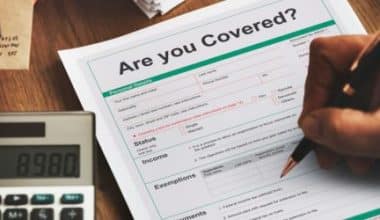A certificate of insurance (COI) is a document issued by an insurance company or broker. The COI verifies the existence of an insurance policy and summarizes the key aspects and conditions of the policy.
It essentially summarizes your business insurance coverage details. It includes the most important, basic information related to your coverage, such as the policy’s expiration date and effective date, who is covered by the policy, what type of coverage it is (general liability insurance, property insurance, etc.), and your policy’s limits.
A certificate of insurance is often requested in the case of a project or job in which liability concerns and the possibility of great financial losses are very real. In such a case, your client or partner will request a COI from you to prove that certain liabilities will be covered by your insurance program.
To acquire a COI, you must first buy a small business liability insurance policy. After the policy has been issued, most certificates of insurance are available online.
How Certificates of Insurance (COI) Work
Certificates of insurance (COIs) are used in situations where liability and significant losses are of concern and require a COI, which is in most business contexts. A certificate of insurance is used to prove insurance coverage.
The certificate of insurance was created in order to make it easier to show proof of insurance to your potential clients and business partners. Instead of sending them your entire insurance policy contract, you can send them a one-page document detailing all the most vital information related to your policy.
Small business owners and contractors often have a COI that proves they have insurance that protects against liability for workplace accidents or injuries. When you purchase liability insurance, the insurance company will usually provide an insurance certificate. Some insurance companies allow you to access your certificate of insurance instantly online, but others may require you to request a copy.
Keep a copy of your COI on hand so you can show it to anyone who asks. It’s also a good idea to know how to have your insurance company send a copy to the person you’re doing business with, in case they’d rather receive it directly.
Commonly included information includes:
- The business name, address and phone number.
- The business owner’s name.
- The name of your insurance company and contact information.
- Your policy number(s).
- Your policy expiration date.
- The amount your insurance policy will pay for individual claims, as well as the maximum amount you are eligible to claim for the year.
- Names and contact information of any other individuals listed on the policy, such as a business partner or an additional insured.
Certificate of insurance details
A certificate of insurance describes your insurance policy, but it is not your policy itself. That document is typically much longer and includes detailed information about what your insurance company covers and excludes.
Certificates of insurance contain separate sections for different types of liability coverage listed as general, auto, umbrella, and workers’ compensation. The term “insured” refers to the policyholder, person, or company appearing on the certificate as being covered by the insurance.
In addition to coverage levels, the certificate includes the policyholder’s name and mailing address and describes the operations that the insured performs. It lists the address of the issuing insurance company along with contact information for the insurance agent or the insurance agency’s contact person. If several insurance companies are involved, it lists all names and contact information.
When a client requests a COI, they become a certificate holder. The client’s name and contact information appear in the bottom left-hand corner along with statements showing the insurer’s obligation to notify the client of policy cancellations.
The certificate briefly describes the insured’s policies and limits provided for each type of coverage. For example, the general liability section summarizes the six limits that the policy offers by category and indicates whether coverage applies per claim or per occurrence. Because state laws determine the benefits provided to injured workers, the workers’ compensation coverage will show no limit.
However, an employer’s liability coverage limits should be listed.
How to get a certificate of insurance
If you are requesting a COI from a contractor or business, they should either be able to retrieve it from their insurance company or provide you with their insurance company’s contact information, so you can ask for that proof to be sent to you directly.
Be careful, however, if you ask your vendor to provide you with a COI. There have been documented cases of contractors submitting fraudulent COIs.
Online business insurance companies often allow you to view your COI online. You may even be able to share an electronic copy with businesses that ask for it or have your insurance company email them a copy. In other cases, you may have to request a copy of your COI via phone, email or your online account.
If you don’t already have business insurance, you’ll need a policy before you can access a COI. Getting business insurance is relatively straightforward if you know what types of coverage you need. You can easily get a business insurance quote online, or go the traditional route of calling an agent over the phone to sign up.
You can get a certificate of insurance (COI) online in three easy steps:
Complete an online application for your business
This asks for details about your business. It takes only a few minutes to complete. You’ll receive quotes from top-rated U.S. insurance companies when you finish the process.
Compare quotes from top companies and choose a policy
Compare your quotes and choose a policy that provides sufficient protection and fulfills any requirements outlined by a commercial lease or client contract.
Small business owners can choose from many different types of business insurance to protect against different risks. For example, general liability insurance provides financial protection against accidents involving customers, while professional liability insurance pays for legal defense costs if a client sues over professional negligence or a mistake.
At this point, you can chat with a licensed agent to make sure you have the right coverage for your small business.
Pay for your policy and download a certificate of insurance
Pay for your policy or sign up for a payment plan. After the policy is issued, you can download a certificate of insurance. This document proves that the certificate holder is insured and includes important details about your policy. The certificate will include:
- Insurance provider
- Type of Coverage
- Policy number
- Policy limits
- Any additional insureds (a client or partner may request this)
- The policy’s expiration date and effective date
How much does a certificate of insurance cost?
A certificate of insurance is free. Much like a receipt, the document is proof that the policyholder paid for the policy and has insurance.
The cost of the policy depends on the type of insurance, your policy limits, and business factors, such as revenue and number of employees.
Who needs a certificate of insurance?
Simply put, if you are hiring an independent contractor or business for their services on your property, you should require a certificate of insurance (COI). If you are a contractor or business, you should have a COI so you can prove to your clients that you are insured.
Without a COI, a business owner or contractor may have difficulty winning contracts. Because many companies and individuals hire contractors, the client wants to know that a business owner or contractor has liability insurance so that they will not assume any risk if the contractor is responsible for damage, injury, or substandard work.
How long does it take to get a certificate of insurance?
Some business insurance companies let you access your COI instantly through your online account. In other cases, you may have to request a copy and you or your business partners will receive it via email.
For example:
- When you buy a policy through online insurance company Next, you immediately get access to an online certificate of insurance that you can share with others electronically.
- With Hiscox, you can enter your email address and policy number online and generate a copy of your COI.
- If your policy is with The Hartford, you can request a copy of your COI online and receive it via email, typically within a few hours.
- With a broker like Insureon, most businesses can receive an ACORD certificate of insurance within a couple of hours of starting their application. Businesses that are more difficult to insure can usually get their certificate within 48 hours.
However, some companies take weeks to mail a certificate of insurance. That’s a big problem for a small business or a contractor who needs immediate proof of insurance coverage to sign a contract.
How long is a certificate of insurance good for?
It would be safest to hold on to any COI you get indefinitely since you do not know when a problem may arise for a job either carried out on your premises or that you completed for someone else. Keeping proof of the COI will help address any issues at that point.
Why do you need a certificate of insurance?
A COI allows you to quickly show others that your business is insured. For example, a commercial lease application may require you to provide a copy of your COI to show that you have general liability insurance in place.
Your company, in turn, can request COIs from other businesses to ensure that you are working with equally trustworthy partners.
If you hire subcontractors to help you complete your work, for example, you’ll want to request a copy of their COI. If you hire someone who does not have adequate insurance coverage, you and your business could be held liable for their mistakes if anything happens on a project you oversee.
When should I get a certificate of insurance?
You should ask for and receive a COI before anyone works on your home or property. If you have a written contract, it should contain insurance requirements, including coverage and limits required that are verified with a COI.
How do you see another company’s certificate of insurance?
If you need to see another business owner’s COI, you’ll have to ask them to show you a copy. To make sure you’re seeing an original document, you may want to see if their insurance company can send you a copy directly.
Viewing another company’s certificate of insurance lets you make sure their coverage is authentic and up to date. This is especially important when you’re hiring subcontractors, since you could end up being held liable for their work if they’re uninsured.
If you asked a business partner to add you as an additional insured, you should request a copy and make sure you see your business’s name on the COI.
How do you add an additional insured to your certificate of insurance?
When you add a person or company as an additional insured on your certificate of insurance, your policy’s insurance coverage extends to them.
It’s common for contractors to add the business that hired them as an additional insured. For example, say you’re a fitness instructor teaching classes at a local studio. The studio may require you to carry general liability insurance and ask you to add their business as an additional insured. That way, if a client accuses you of hurting them and files a lawsuit, it’ll be your insurance policy that pays for the legal defense — not the studio’s.
Some insurance companies allow you to add additional insureds online, but others require you to call and talk to a staff member. Either way, your insurance company should be able to send a copy of your COI to your additional insureds.
Recommended Articles
- Business Insurance Quotes: Getting Insurance Quote Online
- Commercial Auto Insurance: How Does It Work?
- Business Insurance for Consultants: What It Is & How Much It Costs






